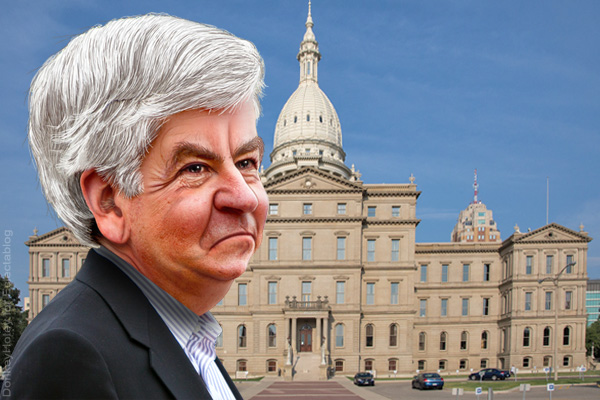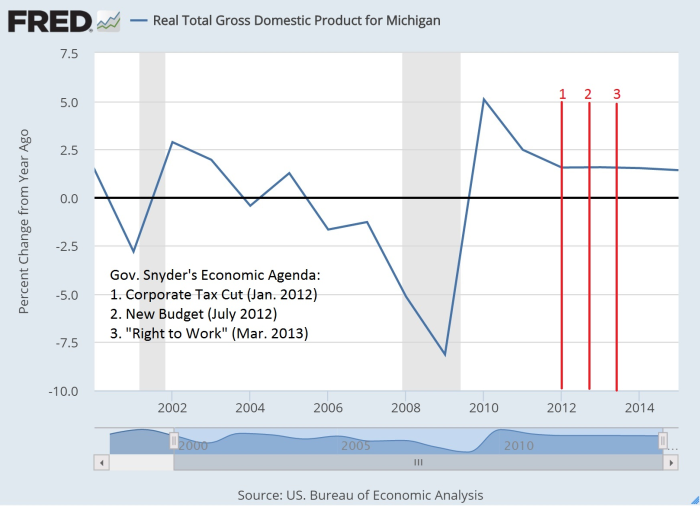The following guest post was penned by Nick Wallace, a freelance writer/data journalist who lives in Ypsilanti.
Enjoy.

Arguments that credit individual politicians with ongoing macroeconomic trends should always be treated with skepticism. It is the rare elected official who can cause a recession or reduce the unemployment rate. This is particularly true of state and local leaders; governors, mayors, and other regional policy-makers have limited influence over the short-term economic fate of their constituents. National and international economic winds are simply too powerful.
So when I saw this Wall Street Journal op-ed crediting Governor Snyder for Michigan’s recent economic upswing, my eyes narrowed. Not only does the op-ed credit a lone politician for causing a macroeconomic trend, it credits a first-term governor who was elected at a time of historical economic upheaval. The standard of proof should therefore be especially high in Governor Snyder’s case; pointing out that enactment of his economic policies coincided with the beginning of the turnaround will not be enough.
Unfortunately, the op-ed’s author, Mary O’Grady, does even less than that. While she highlights “three major reforms under Gov. Snyder [that] have changed the environment for entrepreneurship,” the reforms she credits were all enacted after Michigan’s turnaround had already begun. The chart below shows Michigan’s GDP growth rate and the three reforms O’Grady credits for the recent upswing.

You don’t need to be a calendrical savant to see the timing issue here: Michigan’s turnaround started in 2010; the first of Governor Snyder’s economic policies wasn’t enacted until January 2012. At the very least any argument that the Governor deserves credit for current conditions needs to explain why the economy was doing so well before his agenda took hold. Instead, O’Grady simply pretends those years never happened.
At the same time, she is dismissive of the possibility that the auto bailout, which kept some of the state’s largest employers out of traditional bankruptcy proceedings, played an important role in the turnaround. To make this point she throws a number of arguments against the wall, including that the cash for clunkers program “probably drew from future growth” and that traditional bankruptcy proceedings, had they taken place, may have been just fine for the auto companies (a counterfactual we will thankfully never test).
You’ll note that neither of those arguments forecloses the possibility that the bailouts were the primary cause of Michigan’s ongoing turnaround. Nor does the sequence of events.

This is what happens with state politics. Unlucky governors like Jennifer Granholm get blamed for circumstances over which they had little to no influence (and O’Grady’s op-ed does just that). Others, like Snyder, receive undue credit for being in charge during happier times.
The good news is that Michigan voters seem to understand this. In a June 2016 poll of likely voters in Michigan, just 40% of respondents said they approved of the governor’s job performance, while 52% disapproved. In spite of the state’s low unemployment and relatively strong growth, Governor Snyder is a mighty unpopular guy.
Perhaps this has to do with the gratuitous budget hole those same corporate tax cuts helped to create, or the enduring insult of passing a “right to work” law against the will of the people, or the ongoing crisis in Flint. Unlike a recession, these are the types of problems a governor can almost single-handedly create.
The bad news is that Mary O’Grady, a member of the Wall Street Journal Editorial Board, does not understand the limited macroeconomic influence of a first-term governor’s agenda. Indeed, she argues that given Michigan’s recent turnaround, Snyder’s pro-growth reforms should be a model not only to the rest of the country, but to Ontario, Canada as well.
In particular she contrasts Snyder’s economic agenda with Hillary Clinton’s “big-government solutions and failed left-wing populism.” It’s unclear which big-government solutions O’Grady is referencing. Would something like, oh I don’t know, the auto bailout (which Secretary Clinton supported) fit that description?
[Caricature by DonkeyHotey from photos by Anne C. Savage for Eclectablog]



